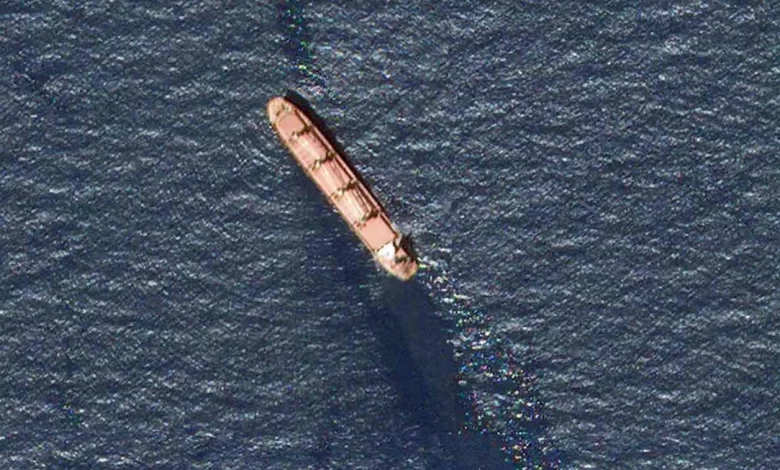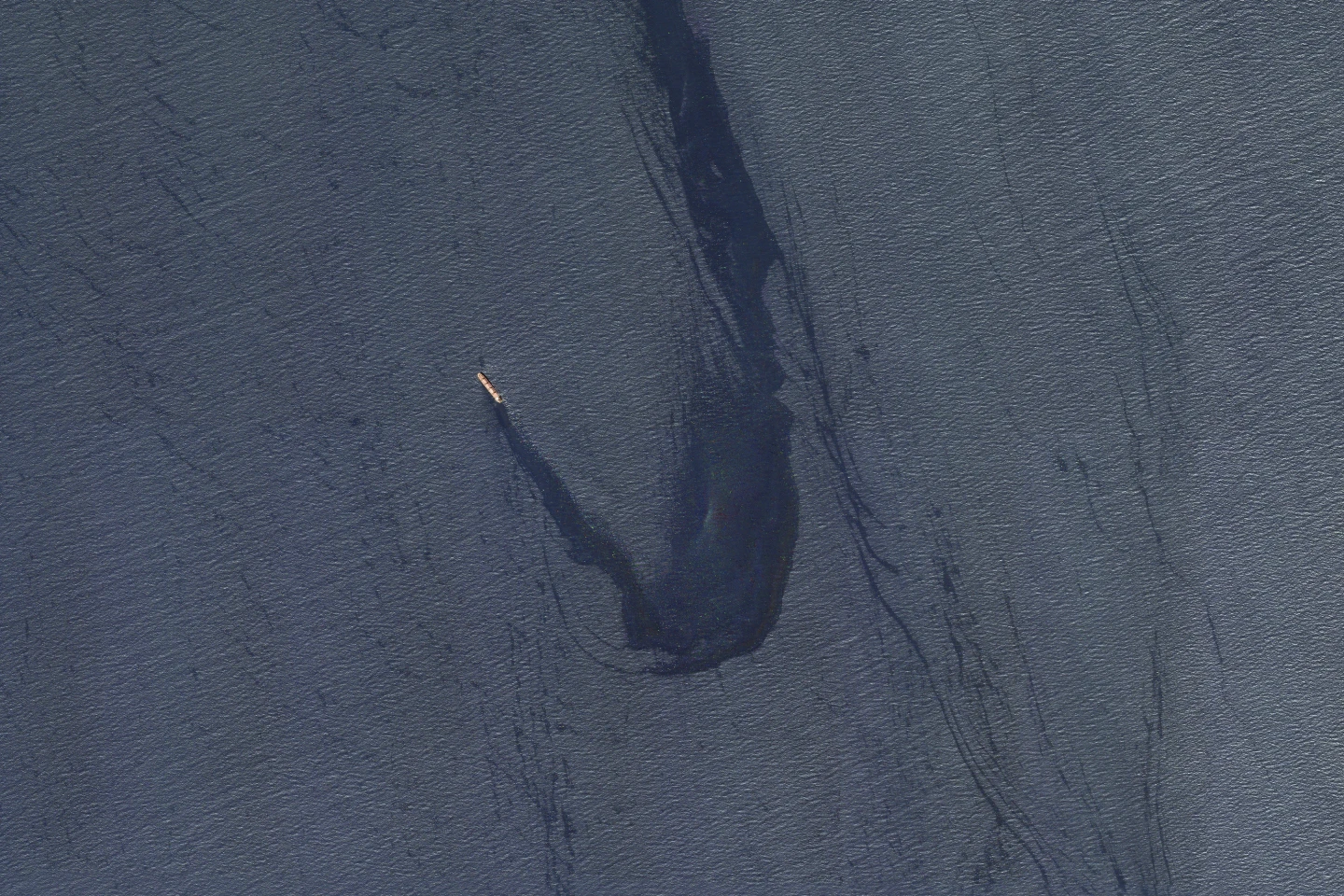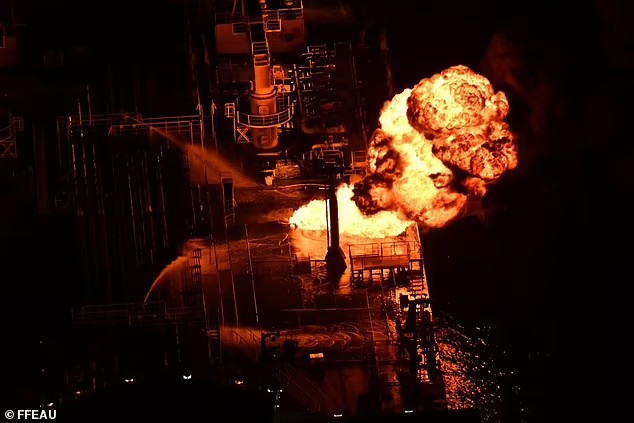
Yemen Monitor/ Reports Unit/ Mujahid Ahmed
On February 18, 2024, the Houthi group in Yemen attacked the Belize-flagged cargo ship “Rubymar” in the Red Sea, causing significant damage and forcing the crew to abandon the ship. The vessel, carrying 41,000 tons of fertilizer, has been slowly taking on water. Satellite images reveal a large, 18-mile oil spill in the Red Sea, raising concerns about a potential environmental catastrophe in the region.
The US Central Command (CENTCOM) confirmed that the vessel was hit by a missile believed to have been launched from Yemen “Houthi run areas” causing a significant damage on the ship’s hull but Fortunately the crew was evacuated safely.
The Houthi group have been engaged in a long-running civil war with the Yemeni government since 2014. The conflict has caused a humanitarian crisis in the country, with millions displaced and facing food insecurity. In recent months, the Houthis have escalated their attacks on commercial shipping in the Red Sea and the Gulf of Aden, which led to direct targeting of the ship ”Rubymar” raising concerns about the security of international trade routes.
The Rubymar’s cargo of fertilizer now poses a significant environmental threat if it spills into the Red Sea which is a vital ecosystem and any large-scale pollution could have devastating consequences . According to a review provided by Frontiers in Marine Science that Fertilizer can cause algal blooms, deplete oxygen levels in the water, and harm marine life.
It has also been proven in numerous researches that can be browsed on most sites in the network that the risks of oil spills at sea may have many kinds of effects . The Yemen monitor team conducted a research and concluded the Environmental Impacts as the following:
- Water Pollution: Oil covers the surface of the water, preventing sunlight from reaching marine organisms, hindering photosynthesis, and reducing the amount of dissolved oxygen in the water.
- Beach Pollution: Oil covers beaches, harming organisms that live on the beach or use it for reproduction.
- Marine Life Pollution: Oil covers the bodies of marine organisms, hindering their ability to breathe and swim, and causing them to become poisoned.
- Coral Reef Destruction: Oil causes significant damage to coral reefs, affecting marine biodiversity.
- Marine Sediment Pollution: Oil can accumulate in marine sediments, affecting organisms that live on the seabed.
In addition to the effects mentioned above the Environmental experts are issuing stark warnings about the critical situation in the Red Sea, where coral reefs are facing a major threat due to the imminent sinking of the “Rubymar” ship.

(Coral reefs are one of the most important marine ecosystems, providing a habitat for a diverse range of marine life, contributing to water purification, and acting as a natural barrier to protect coastlines from erosion).
The disaster is not limited to environmental pollution only, but also extends to a broader extent, which is the economic deterioration, the decline in per capita income and financial insecurity so the attack on the “Rubymar” and its potential environmental consequences raise concerns about various economic effects, including
1-Disruption of maritime trade: The Red Sea is a crucial shipping lane, and the incident could lead to:
- Increased shipping costs: Insurance premiums and rerouting due to safety concerns may raise costs for businesses.
- Delays and disruptions: Blockage or restricted passage through the Red Sea could cause delays in deliveries and impact global supply chains.
2- Impact on fisheries and tourism
- Reduced fish stocks: Marine pollution can harm fish populations, affecting the livelihoods of fishers and the income generated by the fishing industry.
- Loss of tourism revenue: Pollution can damage coral reefs and marine ecosystems, impacting tourism destinations and businesses reliant on them.
3- Costs of cleanup and remediation: Addressing the oil spill and potential fertilizer spill would require significant resources, impacting:
- Governments: Allocating funds for cleanup and potential compensation to affected countries.
- Shipping companies: Depending on liability determinations, companies may incur costs associated with cleanup and environmental damage.
4-Long-term economic effects: The full extent of the environmental damage may not be immediately apparent, potentially leading to:
- Loss of ecosystem services: Healthy marine ecosystems provide various services like water filtration and coastal protection, which have economic value. Their degradation can lead to long-term economic losses.
- Reduced economic productivity: Impacts on fisheries and tourism can have lasting negative consequences for coastal communities and national economies.
Washington, a World Bank report on August 20, 2019 said that the world is facing an unforeseen water quality crisis that will cause a third of potential economic growth to be lost in highly polluted areas, jeopardizing human well-being and environmental safety..
The specific economic effects of the “Rubymar” incident will depend on various factors, including the severity and extent of the environmental damage, the effectiveness of cleanup efforts, and international cooperation in addressing the situation.
The ship ”Rubymar” remains anchored off the coast of Yemen, slowly taking on water, while Several countries, including the US and the UK, have expressed concern about the situation and are monitoring the developments closely.

On its side, the Yemeni government has called for international assistance to prevent an environmental disaster that may occur if the fertilizer spill ,while the Yemeni Minister of Water and Environment Tawfiq Al-Sharjabi said that” We expect the sinking of the “Rubymar” ship to cause a major environmental disaster in the Red Sea” calling for urgent international assistance.
The international community has condemned the Houthi attack on the Rubymar and called for an end to attacks on civilian vessels. Farther more ,the United Nations Security Council has urged all parties to respect international maritime law and protect civilian shipping.
The attack on the ship ” Rubymar” raises serious concerns about the safety of maritime navigation in the Red Sea and the potential for environmental damage that require the international community to work together to find a peaceful resolution to the conflict in Yemen , ensuring the safety of innocent civilians and the environment.
Yemen is already suffering from the largest humanitarian crisis in the world, which makes it helpless in front of the exorbitant costs of cleaning the Seas, which led the Yemeni government to request urgent international support to alleviate the environmental disaster and find solutions to avoid it.




